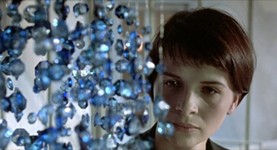Blue
1993 Directed by Krzysztof Kieslowski. Starring Juliette Binoche, Benoit Regent, Florence Pernel, Charlotte Very, Helene Vincent, Hugues Quester, Emmanuelle Riva.
REVIEWED By Marjorie Baumgarten, Fri., March 18, 1994
My first impression is to say that Blue is a very adult movie. By using the word “adult,” I don't mean to imply that it's off-color or unsavory or “difficult” (another word we use when we're trying to say something we're not saying). Blue is a movie that engages the mind, challenges the senses, implores a resolution, and tells, with aesthetic grace and formal elegance, a good story and a political allegory. I'm not alone in thinking so highly of Blue. It is the recipient of numerous critical accolades, one of the most distinctive being the Best Picture award and the Best Actress award for Juliette Binonche at the 1993 Venice Film Festival. Shot in France, Blue is co-scripted and directed in French by the Polish-born Krzysztof Kieslowski who last time out scored a modest arthouse success with The Double Life of Veronique. Moreover, Blue is the first part of an intended trilogy. (The other two films are, of course, Red and White. They are structured around the French concepts of liberty, equality and fraternity. Blue explores liberty, Red equality and White fraternity.) Blue's story is simple. When both her husband, an internationally renowned composer, and her young daughter are both killed in a car accident, Julie (Binoche) is emotionally devastated. Julie attempts to cut herself off from her memories and go on with her life. She trashes the remainder of her husband's work, puts her country home up for sale and moves to an apartment in Paris where she hopes to become anonymously submerged in the city's bustle and crowds. Her halting attempts at remaining aloof begin to go awry as, gradually, she rediscovers the need to connect with other people. And everywhere she keeps hearing this music. The movie begins with the music. She hears refrains from her hospital bed, she hears them while submerged underwater in a pool doing laps, she hears them from the flute of a street musician who works her block. At the time of his death, her husband had been composing a commissioned concerto to honor the reunification of Europe. She also, by chance, discovers that her husband had been having an affair during several years of their marriage and furthermore, his mistress is pregnant with his child. Julie also learns that her husband's assistant Olivier (who has always loved Julie from afar) is finishing her husband's concerto. She decides to help him finish and agrees that the concerto will be credited to all three of them. She also moves back into her unsold country home. Then, as in a coda, the concerto begins to play. Instead of isolated snatches of music, for the first time we hear an extended selection. The music has restored Julie to life. It is finally a completed piece, a lifted curtain on Julie's new beginning, a containment of her unfinished business with the past. Music can restore, music can commemorate. Now, if only it could unify Europe….
A note to readers: Bold and uncensored, The Austin Chronicle has been Austin’s independent news source for over 40 years, expressing the community’s political and environmental concerns and supporting its active cultural scene. Now more than ever, we need your support to continue supplying Austin with independent, free press. If real news is important to you, please consider making a donation of $5, $10 or whatever you can afford, to help keep our journalism on stands.
Marjorie Baumgarten, Dec. 2, 2011
Marjorie Baumgarten, Jan. 31, 2001
Marjorie Baumgarten, Jan. 31, 2001
Blue, Krzysztof Kieslowski, Juliette Binoche, Benoit Regent, Florence Pernel, Charlotte Very, Helene Vincent, Hugues Quester, Emmanuelle Riva










